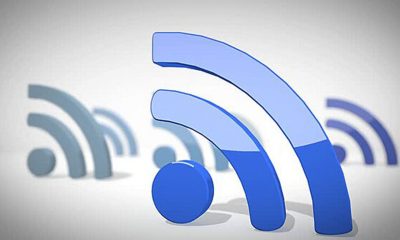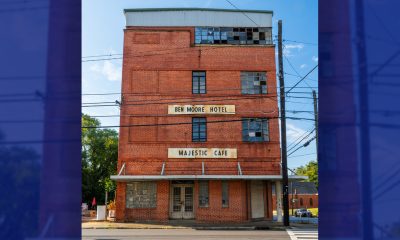Business
PRESS ROOM: The reading is easy at Midway with grand openings of Ink by Hudson
CHICAGO CRUSADER — The Chicago Department of Aviation (CDA) and Midway Partnership cut ribbons for the newest retail offerings taking off at Midway International Airport.
Two new locations provide full-service literary and gift offerings
By The Chicago Crusader
The Chicago Department of Aviation (CDA) and Midway Partnership cut ribbons for the newest retail offerings taking off at Midway International Airport.
Ink by Hudson stores on Concourses A and B are the 16th and 17th concession locations to open at the airport as part of the 70 new food and retail brands arriving at the airport. They are part of a three-year, $75 million concessions expansion that is transforming the concessions lineup for the first time in 20 years, offering travelers and families more reasons to choose Midway than ever before.
“Ink by Hudson provides passengers with the best reading destination and a literary oasis at the airport,” said Jamie L. Rhee, Commissioner, CDA. “We welcome the variety of books, stationery and unique gifts that the Ink stores offer to the discerning traveler.”
While built around a core offering of books, and the Hudson Group’s decades-long passion for bookselling, Ink by Hudson’s concept emphasizes an eclectic collection of toys, gifts, necessities, and indulgences, from timeless quality pieces to pop culture phenomena.
The concessions upgrade is part of the ongoing Midway Modernization Program (MMP) that is improving the Midway passenger experience by expanding concession options, expanding the security checkpoint, and enhancing the terminal parking garage.
The MMP is a nearly $400 million investment in the future of Midway International Airport. It’s the largest improvement program at the airport in nearly 20 years and will upgrade travelers’ experience flying from, to, or through Midway. The MMP is expected to create over 2,500 jobs and includes amenities such as updated and expanded concessions, a vastly improved passenger screening experience, and improved parking facilities.
Today’s celebrations at Midway follow the recent openings of new retail and dining offerings throughout the airport, bringing the number to 17 out of a total of 70 to be established by Midway Partnership by 2020. The new Concourse A Food Hall features many unique, locally-inspired restaurants, including Arami Sushi, Billy Goat Tavern, Woodgrain Neapolitan Pizza, Nuts on Clark, Reilly’s Daughter and an iStore. Other hometown brands include BIG & little’s, Big Shoulders Coffee and PorkChop BBQ, and are bringing new menu choices and amenities to travelers for the first time in nearly two decades.
Later this year, Midway will welcome more local favorites to its expanding restaurant concessions lineup, including Hubbard Inn and the return of Harry Caray’s.
For more information about the Midway Modernization Program, visit www.MDWmod.com.
About the Chicago Department of Aviation (CDA):
The Chicago Department of Aviation (CDA) is self-supporting, using no local or state tax dollars for operations or capital improvements at O’Hare and Midway International Airports. Chicago’s airports offer service to over 260 nonstop destinations worldwide, including 47 foreign countries, combined. Together, Chicago’s airports serve more than 100 million passengers each year, and generate approximately $60 billion in annual economic activity for the region. Visit www.flychicago.com to learn more about the Chicago Department of Aviation.
About Midway Partnership
Midway Partnership is a joint venture comprised of some of the top companies in the aviation industry – Vantage Airport Group, SSP America, and Hudson Group – tasked with transforming the dining and shopping options at Midway Airport. Midway Partnership will invest $75 million over the next three years to bring more than 70 dining and retail brands to Midway by 2020, create 250 construction jobs and 1,400 permanent new jobs and increase the total concessions area from approximately 40,000 square feet to more than 70,000 square feet. Our work will position Midway to be a leading international airport in the coming years, generate tens of millions of dollars for Chicago residents and the city, and improve the travel experiences of the 22 million passengers annually. For more information about Midway Partnership, visit www.midwaypartnership.com.
This article originally appeared in the Chicago Crusader.
Activism
Big God Ministry Gives Away Toys in Marin City
Pastor Hall also gave a message of encouragement to the crowd, thanking Jesus for the “best year of their lives.” He asked each of the children what they wanted to be when they grow up.

By Godfrey Lee
Big God Ministries, pastored by David Hall, gave toys to the children in Marin City on Monday, Dec. 15, on the lawn near the corner of Drake Avenue and Donahue Street.
Pastor Hall also gave a message of encouragement to the crowd, thanking Jesus for the “best year of their lives.” He asked each of the children what they wanted to be when they grew up.
Around 75 parents and children were there to receive the presents, which consisted mainly of Gideon Bibles, Cat in the Hat pillows, Barbie dolls, Tonka trucks, and Lego building sets.
A half dozen volunteers from the Big God Ministry, including Donnie Roary, helped to set up the tables for the toy giveaway. The worship music was sung by Ruby Friedman, Keri Carpenter, and Jake Monaghan, who also played the accordion.
Big God Ministries meets on Sundays at 10 a.m. at the Mill Valley Community Center, 180 Camino Alto, Mill Valley, CA Their phone number is (415) 797-2567.
Activism
First 5 Alameda County Distributes Over $8 Million in First Wave of Critical Relief Funds for Historically Underpaid Caregivers
“Family, Friend, and Neighbor caregivers are lifelines for so many children and families in Alameda County,” said Kristin Spanos, CEO, First 5 Alameda County. “Yet, they often go unrecognized and undercompensated for their labor and ability to give individualized, culturally connected care. At First 5, we support the conditions that allow families to thrive, and getting this money into the hands of these caregivers and families at a time of heightened financial stress for parents is part of that commitment.”

Family, Friend, and Neighbor Caregivers Can Now Opt Into $4,000 Grants to Help Bolster Economic Stability and Strengthen Early Learning Experiences
By Post Staff
Today, First 5 Alameda County announced the distribution of $4,000 relief grants to more than 2,000 Family, Friend, and Neighbor (FFN) caregivers, totaling over $8 million in the first round of funding. Over the full course of the funding initiative, First 5 Alameda County anticipates supporting over 3,000 FFN caregivers, who collectively care for an estimated 5,200 children across Alameda County. These grants are only a portion of the estimated $190 million being invested into expanding our early childcare system through direct caregiver relief to upcoming facilities, shelter, and long-term sustainability investments for providers fromMeasure C in its first year. This investment builds on the early rollout of Measure C and reflects a comprehensive, system-wide strategy to strengthen Alameda County’s early childhood ecosystem so families can rely on sustainable, accessible care,
These important caregivers provide child care in Alameda County to their relatives, friends, and neighbors. While public benefits continue to decrease for families, and inflation and the cost of living continue to rise, these grants provide direct economic support for FFN caregivers, whose wages have historically been very low or nonexistent, and very few of whom receive benefits. As families continue to face growing financial pressures, especially during the winter and holiday season, these grants will help these caregivers with living expenses such as rent, utilities, supplies, and food.
“Family, Friend, and Neighbor caregivers are lifelines for so many children and families in Alameda County,” said Kristin Spanos, CEO, First 5 Alameda County. “Yet, they often go unrecognized and undercompensated for their labor and ability to give individualized, culturally connected care. At First 5, we support the conditions that allow families to thrive, and getting this money into the hands of these caregivers and families at a time of heightened financial stress for parents is part of that commitment.”
The funding for these relief grants comes from Measure C, a local voter-approved sales tax in Alameda County that invests in young children, their families, communities, providers, and caregivers. Within the first year of First 5’s 5-Year Plan for Measure C, in addition to the relief grants to informal FFN caregivers, other significant investments will benefit licensed child care providers. These investments include over $40 million in Early Care and Education (ECE) Emergency Grants, which have already flowed to nearly 800 center-based and family child care providers. As part of First 5’s 5-Year Plan, preparations are also underway to distribute facilities grants early next year for child care providers who need to make urgent repairs or improvements, and to launch the Emergency Revolving Fund in Spring 2026 to support licensed child care providers in Alameda County who are at risk of closure.
The FFN Relief Grants recognize and support the essential work that an estimated 3,000 FFN caregivers provide to 5,200 children in Alameda County. There is still an opportunity to receive funds for FFN caregivers who have not yet received them.
In partnership with First 5 Alameda County, Child Care Payment Agencies play a critical role in identifying eligible caregivers and leading coordinated outreach efforts to ensure FFN caregivers are informed of and able to access these relief funds.FFN caregivers are eligible for the grant if they receive a child care payment from an Alameda County Child Care Payment Agency, 4Cs of Alameda County, BANANAS, Hively, and Davis Street, and are currently caring for a child 12 years old or younger in Alameda County. Additionally, FFN caregivers who provided care for a child 12 years or younger at any time since April 1, 2025, but are no longer doing so, are also eligible for the funds. Eligible caregivers are being contacted by their Child Care Payment Agency on a rolling basis, beginning with those who provided care between April and July 2025.
“This money is coming to me at a critical time of heightened economic strain,” said Jill Morton, a caregiver in Oakland, California. “Since I am a non-licensed childcare provider, I didn’t think I was eligible for this financial support. I was relieved that this money can help pay my rent, purchase learning materials for the children as well as enhance childcare, buy groceries and take care of grandchildren.”
Eligible FFN caregivers who provided care at any time between April 1, 2025 and July 31, 2025, who haven’t yet opted into the process, are encouraged to check their mail and email for an eligibility letter. Those who have cared for a child after this period should expect to receive communications from their child care payment agency in the coming months. FFN caregivers with questions may also contact the agency they work with to receive child care payments, or the First 5 Alameda help desk, Monday through Friday, from 9 a.m. to 5:00 p.m. PST, at 510-227-6964. The help desk will be closed 12/25/25 – 1/1/26. Additional grant payments will be made on a rolling basis as opt-ins are received by the four child care payment agencies in Alameda County.
Beginning in the second year of Measure C implementation, FFN caregivers who care for a child from birth to age five and receive an Alameda County subsidized voucher will get an additional $500 per month. This amounts to an annual increase of about $6,000 per child receiving a subsidy. Together with more Measure C funding expected to flow back into the community as part of First 5’s 5-Year Plan, investments will continue to become available in the coming year for addressing the needs of childcare providers in Alameda County.
About First 5 Alameda County
First 5 Alameda County builds the local childhood systems and supports needed to ensure our county’s youngest children are safe, healthy, and ready to succeed in school and life.
Our Mission
In partnership with the community, we support a county-wide continuous prevention and early intervention system that promotes optimal health and development, narrows disparities, and improves the lives of children from birth to age five and their families.
Our Vision
Every child in Alameda County will have optimal health, development, and well-being to reach their greatest potential.
Learn more at www.first5alameda.org.
Black History
Alfred Cralle: Inventor of the Ice Cream Scoop
Cralle learned carpentry, mechanics, and blacksmithing at a young age. These skills would later become essential in his innovative work. As a young man, he moved to Washington, D.C., where he worked as a porter in hotels and at an ice cream shop. It was there that he first noticed a common problem: scooping ice cream was messy and inefficient. Servers struggled because the ice cream stuck to spoons and ladles, and getting the right shape and portion was difficult. Many needed two hands — one to scoop and one to scrape the ice cream off the spoon.

By Tamara Shiloh
Alfred L. Cralle, an African American inventor and entrepreneur, forever changed the way the world enjoys ice cream. Born on Sept. 4, 1866, in Kenbridge, Virginia, Cralle grew up during Reconstruction — a time when opportunities for African Americans were still extremely limited. Despite the challenges of the era, he demonstrated curiosity, creativity, and a natural ability to understand how tools and machinery worked.
Cralle learned carpentry, mechanics, and blacksmithing at a young age. These skills would later become essential in his innovative work. As a young man, he moved to Washington, D.C., where he worked as a porter in hotels and at an ice cream shop. It was there that he first noticed a common problem: scooping ice cream was messy and inefficient. Servers struggled because the ice cream stuck to spoons and ladles, and getting the right shape and portion was difficult. Many needed two hands — one to scoop and one to scrape the ice cream off the spoon.
Cralle believed there had to be a better way.
Using his mechanical training, he began sketching and experimenting with ideas for a tool that could scoop ice cream easily using one hand. After refining his design, he developed what would become a simple yet brilliant invention: the Ice Cream Mold and Disher. On Feb. 2, 1897, Cralle received U.S. Patent No. 576,395 for the device.
His invention — what we now call the ice cream scoop — was groundbreaking. It featured a built-in scraper that automatically released the ice cream with a single squeeze of the handle. Durable, easy to use, and requiring only one hand, the scoop made serving faster and more consistent. His design was so effective that the basic mechanism is still used today in homes, restaurants, and ice cream shops around the world.
Although his invention became widely used, like many African American inventors of his time, he did not receive the compensation or widespread recognition he deserved. Racial barriers prevented him from fully benefiting from his own creation, even as businesses embraced the tool and the popularity of ice cream continued to grow.
After patenting the scoop, Cralle moved to Pittsburgh. There, he worked as a porter for the luxurious Sterling Hotel and later became a successful businessman. He remained active in his community and continued to create opportunities for himself despite the limitations faced by African Americans at the turn of the 20th century.
Tragically, Cralle died in 1920 at age 54, leaving behind a legacy that would only be fully appreciated long after his passing. Today, he is remembered as the brilliant mind behind one of the most widely used and universally loved kitchen tools.
-

 Alameda County4 weeks ago
Alameda County4 weeks agoSeth Curry Makes Impressive Debut with the Golden State Warriors
-

 #NNPA BlackPress4 weeks ago
#NNPA BlackPress4 weeks agoLIHEAP Funds Released After Weeks of Delay as States and the District Rush to Protect Households from the Cold
-

 #NNPA BlackPress4 weeks ago
#NNPA BlackPress4 weeks agoSeven Steps to Help Your Child Build Meaningful Connections
-

 #NNPA BlackPress4 weeks ago
#NNPA BlackPress4 weeks agoSeven Steps to Help Your Child Build Meaningful Connections
-

 #NNPA BlackPress4 weeks ago
#NNPA BlackPress4 weeks agoTrinidad and Tobago – Prime Minister Confirms U.S. Marines Working on Tobago Radar System
-

 #NNPA BlackPress4 weeks ago
#NNPA BlackPress4 weeks agoThanksgiving Celebrated Across the Tri-State
-

 #NNPA BlackPress4 weeks ago
#NNPA BlackPress4 weeks agoTeens Reject Today’s News as Trump Intensifies His Assault on the Press
-

 #NNPA BlackPress4 weeks ago
#NNPA BlackPress4 weeks agoBreaking the Silence: Black Veterans Speak Out on PTSD and the Path to Recovery





















































